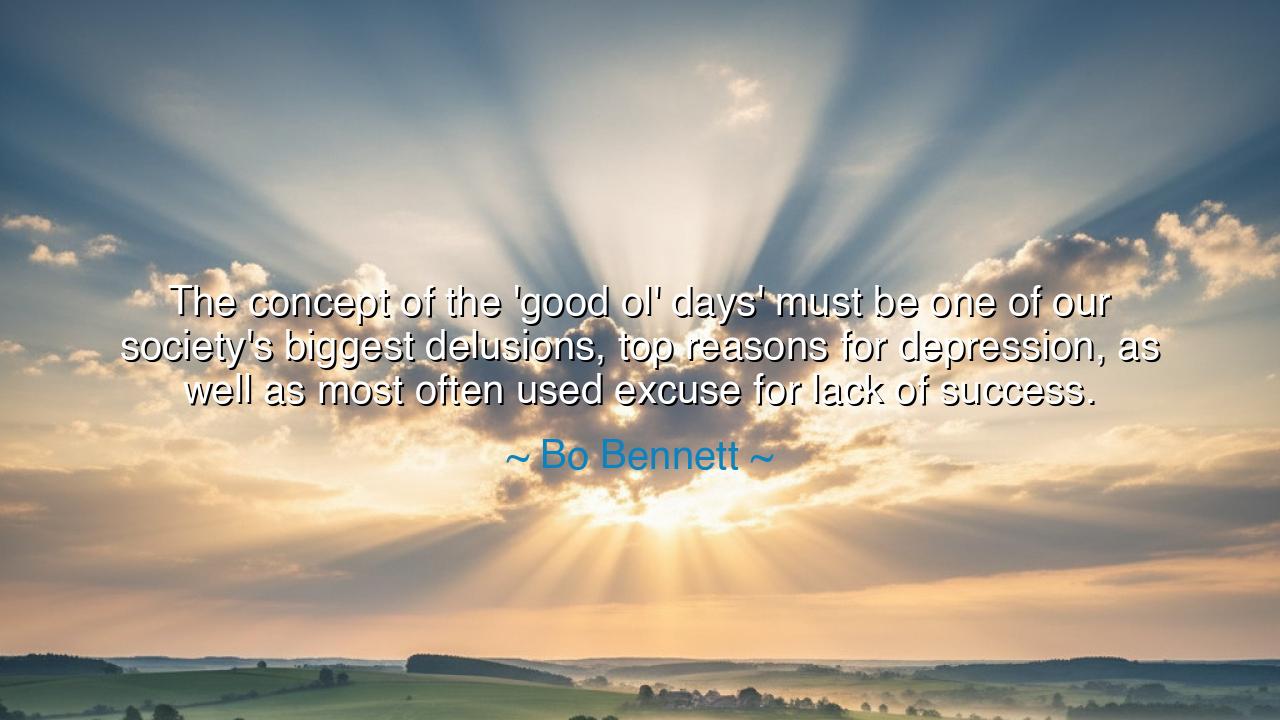
The concept of the 'good ol' days' must be one of our society's
The concept of the 'good ol' days' must be one of our society's biggest delusions, top reasons for depression, as well as most often used excuse for lack of success.






Hear the piercing words of Bo Bennett, who declared: “The concept of the ‘good ol’ days’ must be one of our society’s biggest delusions, top reasons for depression, as well as most often used excuse for lack of success.” These words cut like a sword through the fog of nostalgia. They warn us that to cling too tightly to the past is to forfeit the present, to bow before shadows of memory instead of seizing the fire of today. The so-called “good ol’ days” are not a treasure chest of truth, but often a mirage, crafted by longing and loss, that blinds us to the opportunities of now.
For what are the good ol’ days? They are the memories we paint with colors brighter than they ever were. We recall the joys and forget the sorrows, we cling to the triumphs and cast away the failures. Yet history reveals a harsher truth. Every age, even the golden ones, was filled with struggle, injustice, and pain. To imagine that the past was better simply because it is gone is to live in a delusion, and worse—to chain oneself to a ghost that can never be revived. Such longing leads not to joy, but to depression, for the past cannot return, and those who wait for it are left powerless.
Consider the tale of the Roman Empire. When its might began to crumble, the people longed for the days of Caesar Augustus, when Rome was strong and prosperous. Yet in their longing for the “good ol’ days,” they neglected to reform their present, to face the corruption and division that eroded them. Their nostalgia became an opiate, numbing them to reality until their empire fell to dust. This is the danger Bennett speaks of: when memory becomes an idol, success dies, and the future is lost.
Yet there is also wisdom in remembering the past rightly. For memory should serve not as a dwelling place, but as a teacher. The problem is not that we recall what was, but that we worship it as better than what is. The farmer who clings to the last harvest will starve if he does not plant anew. The soldier who clings to old victories will falter if he does not sharpen his sword for tomorrow’s battles. The student who clings to former knowledge will wither if he does not continue learning. Nostalgia, left unchecked, becomes a thief of action.
Bennett names it rightly: the “good ol’ days” are too often an excuse for lack of success. How easy it is to say, “Things were better back then. I cannot thrive today.” But such words are surrender, the speech of one who refuses to labor in the present. True greatness belongs to those who recognize that every era brings both hardship and opportunity, that the present moment is always the field in which destiny must be planted. The successful man does not yearn for yesterday; he works today, that tomorrow may be brighter than either.
History again gives us a shining example. Abraham Lincoln, born into poverty, could have spent his life lamenting the hardship of his era. He could have sighed for a mythical “better time” when opportunities were easier. But he did not. Instead, he seized the present, educating himself by firelight, persevering through defeat after defeat, until he rose to guide a nation through civil war. His triumph was not born of nostalgia, but of persistence, faith, and action in the moment given him.
The lesson for us, O seekers of wisdom, is clear: do not let the illusion of the good ol’ days rob you of the strength of today. Use memory as a teacher, not a master. When tempted to say, “It was better back then,” turn instead to ask, “What can I do now?” For the present is the only soil where you can plant the seeds of success. To waste it in longing is to starve the harvest of the future.
Therefore, act. Cherish your memories, but live in the present. Build communities that thrive now. Create art, music, and labor that speaks to this age. And when despair whispers that the past was brighter, answer with courage: “I will make today the new good days for those who come after me.” In this way, you will defeat delusion, overcome depression, and walk the path of true success.






AAdministratorAdministrator
Welcome, honored guests. Please leave a comment, we will respond soon